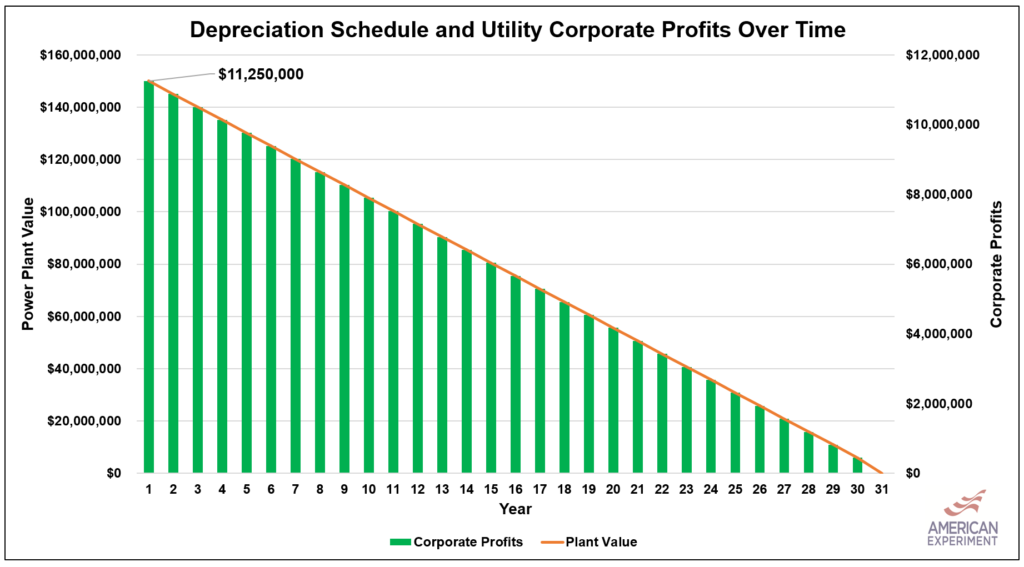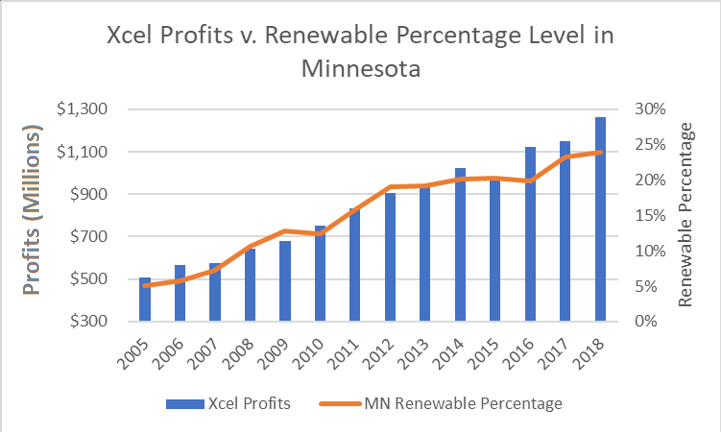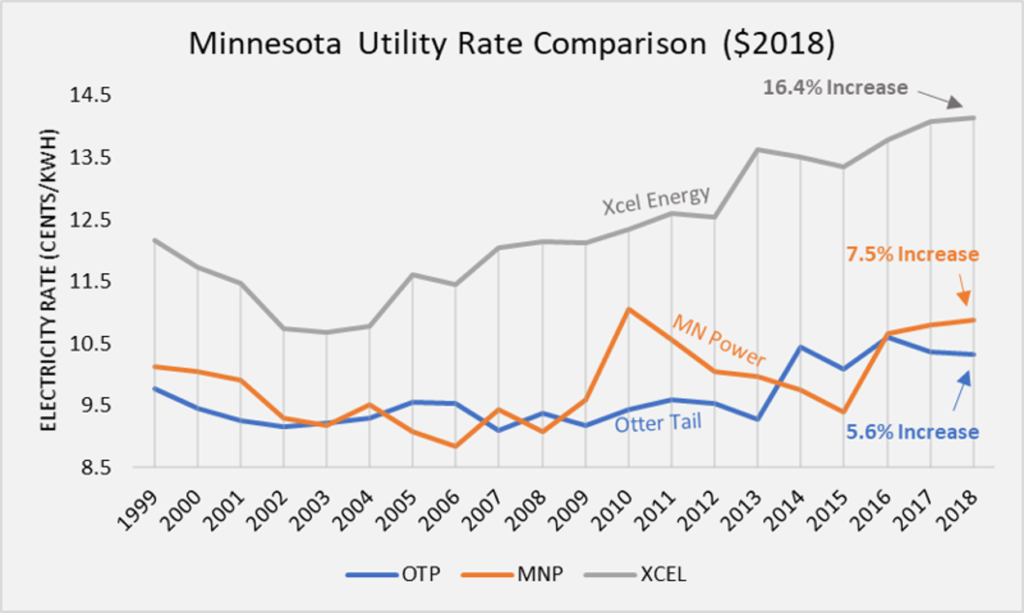Xcel Proposes $3B in Renewable Projects to Bolster Corporate Profits During Pandemic
Last week the Minneapolis Star-Tribune ran an article entitled “Xcel Proposes $3B in Renewable Projects to Bolster Economy Dogged by Pandemic.” In the article, the author discusses Xcel’s plan to spend billions of dollars on renewable energy projects.
What is missing from the piece is Xcel’s underlying motive for fast forwarding the projects, exploiting the high unemployment caused by the COVID-19 shutdown to increase their government-guaranteed corporate profits.
There is No Free Market for Electricity in Minnesota
One of the single-most important things conservatives need to know about Minnesota’s electric system is that there is no free market for electricity, and investor owned utilities like Xcel Energy are not truly private companies.
In actuality, companies like Xcel are government-approved monopolies, and their customers are forced by the government to purchase their electricity from the company in their service territory. This means Minnesota families and businesses have no freedom to shop around for lower prices or better service.
In return for this guaranteed market share, electric companies are not allowed to make a profit on the electricity they sell. Instead, they operate under an agreement with state regulators called “cost of service” regulation.
This means the state government will let the company charge enough for the electricity you use to offset the cost of providing electricity to customers, plus a profit of 7.5 percent on the cost of new power plants, transmission lines, and even their corporate offices.
As you can imagine, this gives companies like Xcel a powerful, and perverse, incentive to spend as much as possible to increase their corporate profits at the expense of the Minnesota families and businesses who are forced to purchase their electricity from them.
Spend More, Make More
To really understand how this works, it helps to use an analogy.
Imagine you are redecorating your living room.
If you have to pay for all of your expenses out of your own pocket, like normal people, you would likely replace the one or two items most in need of replacement. And, being a fiscal conservative, you would shop around to get the best value, getting the best quality for the lowest price. You would also likely consider how sturdy the furniture is, opting to buy the furniture that will last the longest.
Now, imagine that you weren’t paying for your own furniture, and that you would be reimbursed for your purchases. In all likelihood, this change in incentive structure would drastically alter your redecorating plans.
Instead of only replacing one or two pieces of furniture, you’d replace more pieces because you’re not footing the bill. You’d also probably opt to buy more expensive pieces than you would before, because the importance of value is greatly diminished when you’re not paying for the furniture out of pocket. Lastly, you also would care less about the sturdiness of the furniture because prices are no longer an issue.
Now, imagine you’re getting paid a 7.5 percent profit for each dollar you spend on replacing your furniture. Suddenly the coffee table, flat screen television, and sound system that were perfectly serviceable under normal circumstances simply must go.
In fact, everything must go.
Not only would you invent reasons to replace every piece of furniture in your house, but you’d try to replace them with the most expensive alternatives possible, because this perverse incentive would benefit you most. Rather than investing in durable items, you would seek out the flimsiest, most expensive items possible, because if they break, you get to make even more money!
This last scenario is the world that Xcel Energy lives in, which is why the company is seeking to spend as much money, as quickly as possible, to the detriment of the Minnesota families and businesses who are forced to buy their electricity from them.
Out with the Old, In with The Expensive and Unreliable
Now we’re going to imagine we are Xcel Energy, and we’re going to add one last wrinkle to our analogy above. Utility companies don’t get their 7.5 percent profit all at once. This profit is paid out on the value of the plant each year, minus any depreciation.
This can be a hard concept to visualize, so I’ve created the graph below to give the reader a better image.
In this example, a power plant worth $150 million in year one is depreciated over 30 years. In year one, the $150 million plant evaluation means that Xcel would make about $11.2 million in profits on the plant that year($150 million x 7.5%).
As the plant is depreciated over time, the company makes less and less profit on it. By year 31, Xcel would make zero profit on this hypothetical power plant. Because Xcel is not profiting from the plant, they have a very powerful incentive to close it down and build the most expensive, and shortest-lived power plants they possibly can, and this is exactly what Xcel is attempting to do.

Xcel wants to shut down their affordable, reliable coal-fired power plants and replace them with billions of dollars in spending on wind turbines, solar panels, transmission lines, and the natural gas plants needed to make sure the lights don’t go out when the weather isn’t cooperating.
Xcel’s coal plants have been reliably generating electricity for decades. The Sherburne County coal-fired power plant units 1, 2, and 3 came into service in 1976, 1977, and 1987, respectively, which means Xcel isn’t making much, if any, profit on these plants. This is why Xcel wants to shut them down a decade before the end of their useful lives and replace them with wind turbines that only last for 20 years (some only last for ten years before they are “repowered” to regain their eligibility for federal subsidies), and solar panels that only last 25 to 30 years.

The most-wasteful remodeling strategy has served Xcel’s shareholders, and CEO very well. The graph below shows Xcel’s corporate profits growing over time as the company has added more renewable energy to their generation portfolio. The more the company spends on building new power plants, the more profit it makes.

The problem with this arrangement, however, is that the money has to come from somewhere, and that somewhere is your pocket.
The Highest Electricity Prices in Minnesota
Minnesota’s electricity prices have increased dramatically since renewable energy was mandated in our state, but the statewide numbers hide a more interesting story; Xcel Energy customers have suffered the most from increasing amounts of renewable energy on the electric grid, and they will suffer even more after Xcel spends $3 billion on wind and solar projects.
The graph below was constructed using data from the U.S. Energy Information Administration and it shows electricity prices for each of Minnesota’ three investor owned utilities, Xcel Energy, Minnesota Power, and Ottertail Power.

As you can see, Xcel customers pay far more for their electricity than those served by other utilities in the state. This gap will continue to grow moving forward due to Xcel’s plan to retire their coal plants early, and wastefully spend billions of dollars on wind turbines, solar panels, transmission lines and natural gas plants that are unneeded to meet our electricity demand.
The best way to combat these perverse incentives is to let Minnesota families and businesses choose their own electricity provider. If I, someone who is currently forced to buy my power from Xcel, were able to switch to Minnesota Power or Ottertail Power to save money, that would provide Xcel an incentive to cut their own prices to stay competitive.
Conclusion: It’s All About the Benjamin’s, Baby
Xcel Energy is seeking to exploit Governor Walz’s “Great Suppression” of Minnesota’s economy by ramming through their wind and solar projects to grow their corporate profits and to qualify for more federal subsidies.
It is important for conservatives to understand that there is nothing free market about this situation, and the rush to renewables is just an attempt by a government-approved monopoly to abuse the system in order to benefit themselves at the expense of the people who are forced, by the government, to buy their product.
Raising the cost of electricity will hurt all Minnesota families and businesses because it will mean businesses will have to raise their prices to make up for higher overhead costs, and families will have less expendable income to afford their products.
As a result, Xcel Energy is compounding the economic pain Minnesotans are feeling due to COVID-19, not easing it.